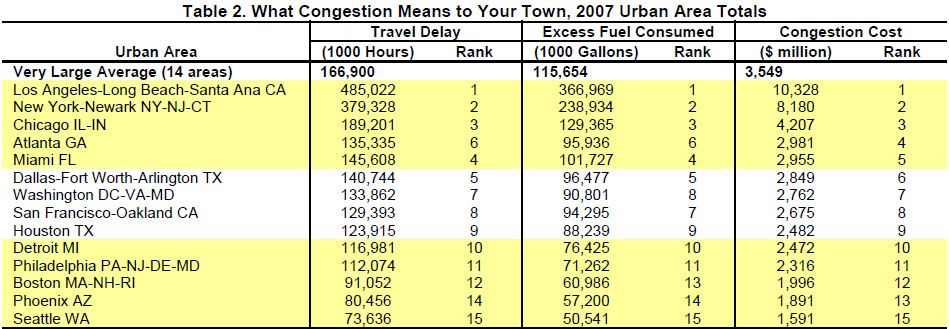According to a report from the Texas Transportation Institute, motorists across the country in 2007 combined to spend the equivalent of 175 million days in traffic and purchase an extra 2.8 billion gallons of fuel due to congestion.
The 2009 Urban Mobility Report, which the institute released in July, states the figures actually represent a drop from 2006.
And if you think those 4.2 billion hours are bad enough, consider motorists would have sat in traffic for a half-a-billion hours without public transportation as an option, the report said.

In Chicago, the study ranked the city 21st in terms of annual delay per traveler (41 hours) and 20th for wasted fuel per motorist (28 gallons). In terms of peak period congestion to the travel time at free-flow conditions, Chicago ranked second-worst with a value of 1.43. For comparison sake, a value of 1.30 indicates that a 20-minute trip without traffic takes 26 minutes during peak traffic conditions.
The report studied nearly 440 metro areas across the country and found — like most reports — that Los Angeles was the most congested city in the U.S., with an average motorist in 2007 spending about 70 hours in traffic.
New York City ranked second.
Here in Chicago, the study ranked the city 21st in terms of annual delay per traveler (41 hours) and 20th for wasted fuel per motorist (28 gallons).
The Second City got its high marks — if you can call it that — for the study’s travel time index.
In terms of peak period congestion to the travel time at free-flow conditions, Chicago ranked second-worst with a value of 1.43. For comparison sake, a value of 1.30 indicates that a 20-minute trip without traffic takes 26 minutes during peak traffic conditions.
Some of the suggested remedies are nothing new: More roadways with more lanes of traffic and better public transportation.
Some deserve consideration: Improved traffic-signal synchronization, adding capacity on highways and rail lines, offering increasing chances for employees to work flexible hours outside the major rush periods or to work from home and encouraging transit-oriented communities, where housing, jobs and stores are within range of pedestrians, bicyclists and transit riders.
Tim Lomax, a transportation institute researcher told WBBM 780 that he sees the upside and downsides of commuting.
“Congestion won’t be as bad as before for a while, but it will still be very frustrating, very unreliable and it will take a lot of time out of your day,” Lomax told WBBM. “The average traveler still needs 25 percent more time for their rush-hour trips.”
In his report, the Tribune’s Jon Hilkevitch wrote the study found that as the economy improves, congestion will be the worst in regions of the country that have failed to invest in mass transit and roadway improvements. That doesn’t bode well for the Chicago Transit Authority, Metra and Pace, which according to the article need about $10 billion in new capital funding over the next five years to get their systems to a state of good repair.